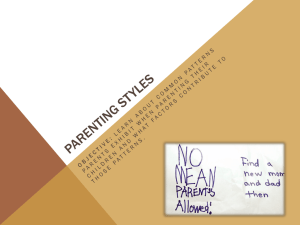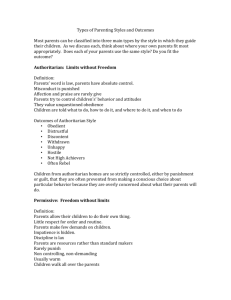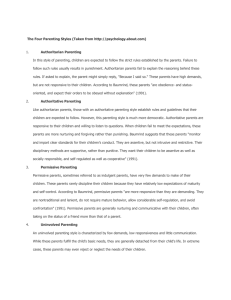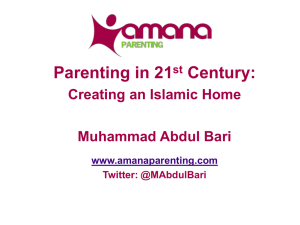Parental Feeding and Parenting Styles
advertisement
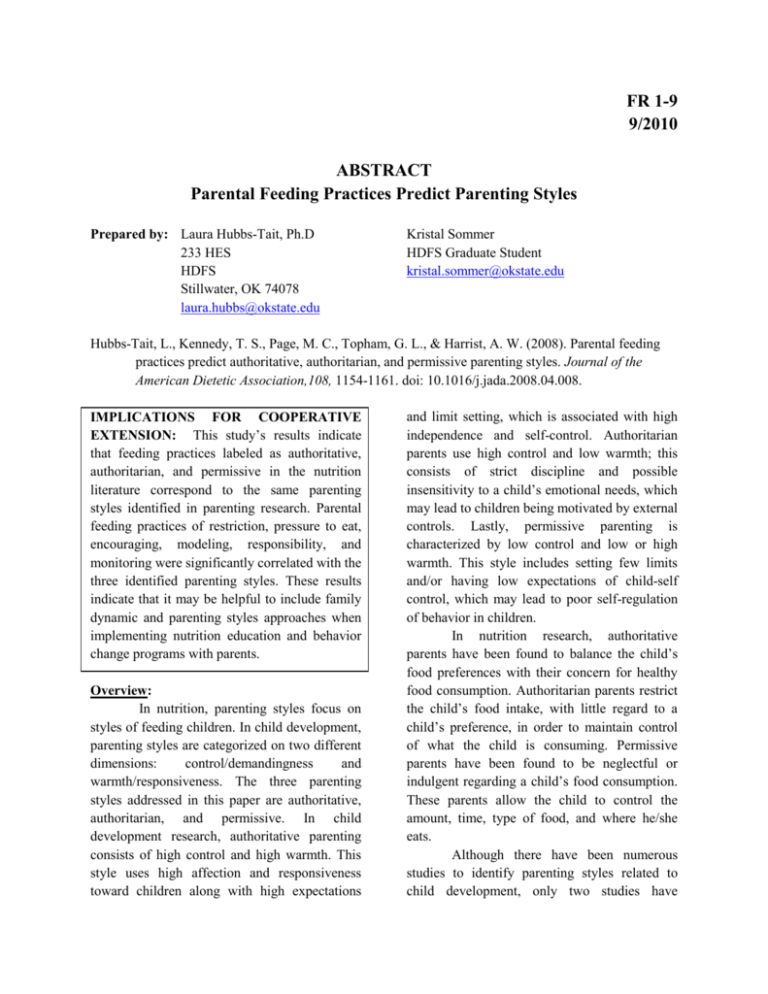
FR 1-9 9/2010 ABSTRACT Parental Feeding Practices Predict Parenting Styles Prepared by: Laura Hubbs-Tait, Ph.D 233 HES HDFS Stillwater, OK 74078 laura.hubbs@okstate.edu Kristal Sommer HDFS Graduate Student kristal.sommer@okstate.edu Hubbs-Tait, L., Kennedy, T. S., Page, M. C., Topham, G. L., & Harrist, A. W. (2008). Parental feeding practices predict authoritative, authoritarian, and permissive parenting styles. Journal of the American Dietetic Association,108, 1154-1161. doi: 10.1016/j.jada.2008.04.008. IMPLICATIONS FOR COOPERATIVE EXTENSION: This study’s results indicate that feeding practices labeled as authoritative, authoritarian, and permissive in the nutrition literature correspond to the same parenting styles identified in parenting research. Parental feeding practices of restriction, pressure to eat, encouraging, modeling, responsibility, and monitoring were significantly correlated with the three identified parenting styles. These results indicate that it may be helpful to include family dynamic and parenting styles approaches when implementing nutrition education and behavior change programs with parents. Overview: In nutrition, parenting styles focus on styles of feeding children. In child development, parenting styles are categorized on two different dimensions: control/demandingness and warmth/responsiveness. The three parenting styles addressed in this paper are authoritative, authoritarian, and permissive. In child development research, authoritative parenting consists of high control and high warmth. This style uses high affection and responsiveness toward children along with high expectations and limit setting, which is associated with high independence and self-control. Authoritarian parents use high control and low warmth; this consists of strict discipline and possible insensitivity to a child’s emotional needs, which may lead to children being motivated by external controls. Lastly, permissive parenting is characterized by low control and low or high warmth. This style includes setting few limits and/or having low expectations of child-self control, which may lead to poor self-regulation of behavior in children. In nutrition research, authoritative parents have been found to balance the child’s food preferences with their concern for healthy food consumption. Authoritarian parents restrict the child’s food intake, with little regard to a child’s preference, in order to maintain control of what the child is consuming. Permissive parents have been found to be neglectful or indulgent regarding a child’s food consumption. These parents allow the child to control the amount, time, type of food, and where he/she eats. Although there have been numerous studies to identify parenting styles related to child development, only two studies have addressed parenting styles related to feeding practices. In order to add to the literature, this study addressed three hypotheses. First, it was hypothesized that coercive feeding practices (pressure to eat and restriction) are positively related to authoritarian parenting whereas supportive feeding practices (monitoring, modeling, responsibility, and encouraging) are negatively associated with authoritarian parenting. Second, supportive feeding practices are positively related to authoritative parenting whereas coercive practices are negatively associated with authoritative parenting. Third, permissive parenting is negatively associated with both coercive and supportive feeding practices: restriction, pressure to eat, encouraging, modeling, responsibility, and monitoring. Questionnaire assessed the use of authoritative, authoritarian, and permissive parenting styles. Method: Sample: Two hundred thirty-nine primary caregivers, 93.5% mothers, of first grade children (105 girls; 134 boys) participated. The average annual household income of this rural sample was $24,000 to $30,000, with $37,020 being the average annual household income for Oklahoma during 2005. The majority of primary caregivers had finished high school, with 31% graduating from college. Non-Hispanic white (64%) and Native American (12%) were the top two race/ethnic groups included in the study. Discussion: This was the first study addressing how parental feeding practices identified as authoritarian, authoritative, and permissive in the nutrition literature predict the general parenting styles identified in parenting and child development research. Authoritative parenting was correlated with responsibility, monitoring, encouraging, and modeling feeding practices. For example, parents who were more authoritative perceived themselves as more responsible for deciding whether their child had eaten the right kinds of foods and had the right portion sizes. They were also more likely to model eating fruits, vegetables, and low-fat snacks and to monitor their children’s eating of both nutritious and high-fat or high-sugar foods. In addition, this study found that many parental feeding practices had similar significant correlations with permissive and authoritarian parenting styles. For example, parents who are more permissive or more authoritarian are both more likely to offer their children sweets or favorite foods as rewards for good behavior and less likely to model eating fruits and vegetables. Measures: Primary caregivers were given four questionnaires to complete about themselves and their children. Ages, parental education, income, and ethnicity information were collected through a demographic questionnaire. The Child Feeding Questionnaire assessed caregiver perceptions regarding child feeding practices and parental practices. Parental influences on child consumption of fruits and vegetables, from the child’s perspective, were measured using the Encourage Healthy Eating and Modeling questionnaire. Parenting Styles and Dimensions Results: Overall, feeding practices overlapped significantly with parenting styles. The greatest overlap was authoritative (21%), followed by authoritarian (15%), and permissive (8%). For the first hypothesis, pressure to eat, restriction, and low monitoring significantly predicted the authoritarian parenting style. For the second hypothesis, parental perceptions of responsibility and parental monitoring, low restriction, and high modeling significantly predicted authoritative parenting. For the third hypothesis, analyses indicated that low parental modeling and low restriction significantly predicted permissive parenting. They are also more likely to restrict their child’s favorite foods. Although there were similarities, differences between authoritarian and permissive styles consist of authoritarian parents using more pressuring techniques and permissive parents using fewer modeling techniques. Overall, the study’s results confirm that a relationship exists between general parenting styles and parental feeding practices. Thus, the findings suggest that practitioners and researchers should address parental feeding practices jointly with family dynamics to better implement programs of dietary change and obesity treatment.
